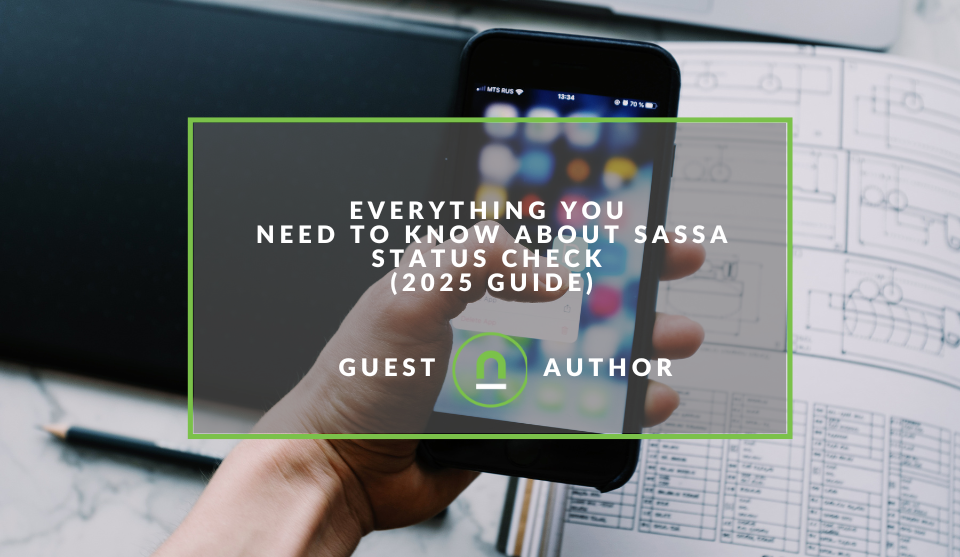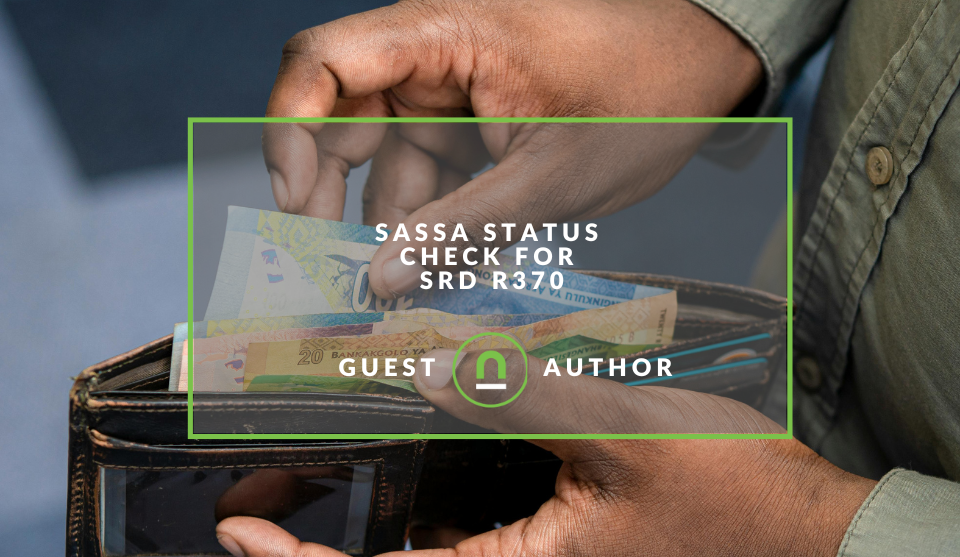Recent posts

Money Talks
Everything You Need to Know About SASSA Status Check
13 April 2025

Mind, Body & Soul
The Genetic Diversity of Cannabis Seeds
12 April 2025

Money Talks
How Small Businesses Can Leverage Blockchain Technology
02 April 2025

Industry Experts
Mastering Personalization in Digital Marketing
31 March 2025
Popular posts
Extravaganza
Trending Music Hashtags To Get Your Posts Noticed
24 August 2018
Geek Chic
How To Fix iPhone/iPad Only Charging In Certain Positions
05 July 2020
Extravaganza
Trending Wedding Hashtags To Get Your Posts Noticed
18 September 2018
Money Talks
How To Find Coupons & Vouchers Online In South Africa
28 March 2019
SASSA Status Check for SRD R370
26 March 2025 | 1 comments | Posted by Khan Sahab in Money Talks
The COVID-19 pandemic brought unprecedented challenges to South Africa, exacerbating existing inequalities and pushing millions into deeper poverty. In response, the South African Social Security Agency (SASSA) introduced the Social Relief of Distress (SRD) grant, commonly known as the COVID-19 relief grant.
This temporary measure aimed to provide much-needed financial assistance to vulnerable individuals who were severely impacted by the pandemic.
What is the SASSA SRD Grant?
The SRD grant was designed to support South African citizens, permanent residents, and refugees who met specific eligibility criteria. Initially, the grant targeted individuals who were unemployed and did not receive any other form of social grant or Unemployment Insurance Fund (UIF) payments.
Key features of the grant included:
- Target Beneficiaries: Unemployed individuals between the ages of 18 and 60, who were not receiving other social grants, UIF, or NSFAS support.
- Purpose: To alleviate the financial strain caused by the pandemic, particularly for those who lost their livelihoods or were unable to find employment.
- Evolution: The grant has evolved over time, with adjustments to eligibility criteria and the amount provided.
The Cost to the Country
Estimating the precise cost of the SRD grant is complex, as it has varied depending on the duration, number of beneficiaries, and the amount disbursed. However, it's safe to say that the program has represented a significant expenditure for the South African government.
- The grant has been a multi-billion rand expense. The exact figures fluctuate based on the amount paid per person and the amount of people receiving the grant.
- The ongoing nature of the grant and its multiple extensions have added to the overall cost.
- The grant funding has required the government to reallocate funds and increase borrowing.
The substantial expenditure highlights the government's commitment to social protection during a crisis but also raises important questions about fiscal sustainability.
Why Was the Grant Instigated?
The SRD grant was introduced as a direct response to the devastating economic consequences of the COVID-19 pandemic. Key factors that led to its implementation include:
- Job Losses: Lockdowns and economic disruptions resulted in widespread job losses, leaving many individuals without income.
- Increased Poverty: The pandemic deepened existing poverty levels, pushing vulnerable households further into financial distress.
- Social Instability: The potential for social unrest and instability was a significant concern as people struggled to meet basic needs.
- Social Protection: The government recognized the urgent need to provide a safety net for those who were most affected by the crisis.
- Mitigation of suffering: The grant was instigated to mitigate the suffering of the most vulnerable people in South Africa, who were unable to provide for themselves.
The SRD grant served as a crucial lifeline for millions of South Africans during an incredibly challenging period. While the financial implications are significant, the program's impact on mitigating poverty and social instability cannot be understated. The ongoing discussions about the grant's future and how to continue to support vulnerable people are an important part of South Africa's future.
Temporary Intervention Becomes Permanent Fixture
The South African Social Security Agency provides a vital support system for numerous individuals experiencing financial difficulties and for those who remain unemployed in the country.
While SASSA pays out several benefits, from child grants to old age grants, the Social Relief of Distress grant, commonly known as the 350 grant, now the 370 grant, has become a mainstay.
If you have submitted an application for this grant and wish to determine your approval status, it is crucial to monitor your application.
This guide will outline steps to check your SASSA status, provide information on payment timelines, and address frequently asked questions regarding the process.
How to Check SASSA R370 Status?
This is how it is done:
On the SASSA Website: To check if your SRD R370 grant application was accepted or not, you may perform the following actions:
- Go to the SASSA status check website
- Fill in your ID number and cellphone number used at the time of application.
- Click on the "Check SASSA" option to view your application status.
The system would indicate if your application is still being processed, approved, or rejected.
By SMS
If the SASSA website is offline, you can also use SMS service to verify your grant application status.
SASSA provides an option for SRD status checks through SMS. To do this, text your ID number to 082 046 8553. You will receive a reply containing the status of your application.
How Long Does It Take to Receive R370 Aid?
The waiting time for approval and payment of SRD R370 varies, but typically, it can take anywhere from 2 to 6 weeks after your application is submitted. However, payments are processed monthly, so if you miss a payment, you can check the stats to see if there was an issue with your application.
Common Reasons for Application Rejections
Despite the help given by SRD million, applications for the same are turned down for certain reasons. Following are the most common reasons why your application for R370 might be rejected:
Earning an income which makes you ineligible: If your earnings go beyond a certain income threshold, then your application is rejected.
- Duplicate Applications: SASSA automatically rejects one of the applications if you happen to apply more than once under different personal details.
- Incorrect or Missing Particulars: If your particulars, like ID number, bank account details, etc., are incorrect or not complete, delays may occur in the process or rejection of the application.
- Government Employees: If you are already receiving a government salary or social grant, you may not qualify for SASSA.
Tell us your story
Would you like to write for nichemarket just like Loria has? Find out how to submit a guest post, and when you're ready, you can contact us.
Do you require financial help?
Find a financial advisor or financial consultant in your area
Get started with nichemarket
If you are a financial adviser and would like more leads, then why not list your business with nichemarket? Registering with nichemarket is easy; all you will need to do is head over to our sign-up form and follow the instructions. If you require a more detailed guide on how to create your profile or your listing, then we highly recommend you check out the following articles.
Recommended reading
If you enjoyed this post and have the time to spend diving deeper down the rabbit hole, then we suggest you check out the following posts about improving your finances in South Africa.
- How To Never Pay Full Price At South African Cinemas
- How To Find Local Freelance Work In South Africa
- Over 40 South African Tech Business Ideas That Require Little To No Capital
- How South Africans Can Save Money Each Month
- The Pros and Cons Of Tap and Go Cards
Tags: Finance, Charity, Grants, Guest Post
You might also like
The Genetic Diversity of Cannabis Seeds
12 April 2025
Posted by Alina Jones in Mind, Body & Soul
A look into the South African heritage of cannabis growing and how the country has taken the plant in terms of growing it into a viable industry & th...
Read more4 Types of Essential Socks Every Man Should Own
25 March 2025
Posted by Candice Reed in Fashionista
Upgrade your sock drawer! Discover the four essential sock types every man needs for style & comfort. From dress to athletic, we've got your needs co...
Read more{{comment.sUserName}}
{{comment.iDayLastEdit}} day ago
{{comment.iDayLastEdit}} days ago
 {{blogcategory.sCategoryName}}
{{blogcategory.sCategoryName}}

